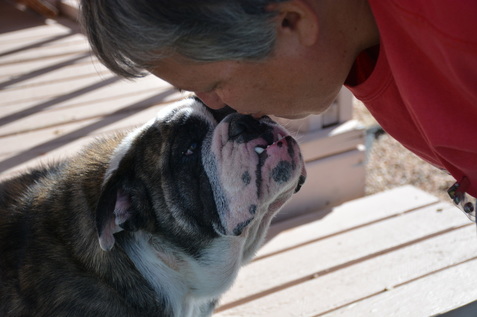 We hear the phrases all the time: "Adopt! Don’t Shop!" and "Don’t Breed or Buy While Shelter Dogs Die!" In a perfect world more people would adopt animals from shelters and rescue groups and that would be the go-to option for most families. In that same perfect world, the only dog breeding taking place in our country would be done by responsible breeders who are in it not for the money, but to perpetuate breed standards (as compared to modifying breeds to the point where it is abusive and the dogs either cannot walk or cannot breathe). Ours is not a perfect world. A lot of people get dogs who come from puppy mills or huge dog breeding operations because they are either blinded by the cuteness they see or they don’t want to know where the dog came from or a combination of the two. There are, in fact, responsible breeders out there, none of whom would ever sell a dog in a pet store or in a Walmart parking lot. I know there are those who oppose all dog breeding. I simply do not because I think that’s unrealistic. I oppose irresponsible breeding and breeding with a focus on profit and with little or no regard for the well-being of dogs. We in rescue and advocacy tell the public one thing all the time: do not buy a dog from a pet store. Do not, do not, do not. We tell them that when they buy that cute puppy in the window, they are only perpetuating an industry which enslaves dogs in conditions that would make us sick if we saw pictures or actually went there. We also tell them to not buy dogs from web sites, newspaper ads or street corners and to engage in due diligence in dealing with local breeders to determine the conditions from which the dog came to make sure they are not inadvertently supporting a mill operation. In essence, we are zero tolerance when it comes to people buying puppy mill dogs. We encourage them to "just say no" and we judge people harshly who cave in to that cute little face in the pet store and who buy the puppy, sometimes for thousands of dollars.  But what about how we behave as rescuers and advocates? Are we really any better than the public we are so quick to judge? Most of the people I know in rescue are those I would describe as purists. They either pull animals from animal shelters (most of which are kill facilities) to adopt them out to the public or they take animals directly from the public in order to find them new homes. In many cases they are taking the harder-to-place animals as opposed to younger or "cuter" animals and they function based solely on donations and with no taxpayer assistance. These people are surely aware of the concept of a dog auction but they have never attended one and would never even consider going to one. There is a faction in the rescue community, however, which engages in behavior which is not only as bad as buying a dog from a pet store, but is in some ways much, much worse as far as I'm concerned: I’m talking about rescuers who buy dogs at auction. I first touched on this topic very briefly in a blog I wrote in late July which caused quite a bit of uproar from people who don’t agree with me. I was on the receiving end of some pretty strong hostility and a lot of accusations. I’m okay with that. I will not be bullied. My opinions are my own and while I love dogs, my opinions on the topic of rescuers at dog auctions is based on reason and logic and not on my emotional attachment to dogs. I want to be perfectly clear on this subject. As much as those in rescue and advocacy circles are zero tolerance for people who buy a puppy from a pet store, I am equally zero tolerance when it comes to rescuers who pay large amounts of money for dogs at auction and call it "rescue." It is not. I’m not sure exactly what to call it other than a purchase, but it is not rescue. For me, it actually borders on a form of either collecting behavior at the worst and "ego rescue" at the least. I know that saying this will not be popular with many in the rescue community. So why bother? I’m saying it because I think it needs to be said, both for the benefit of some in the rescue community who can be reached and for the benefit of those who donate to rescues, thinking they are doing a good thing by helping a rescue group buy dogs at auction. (click on image to view as a .pdf file)  In order to present my position on this topic more thoroughly, I reached out to some of my subject matter experts on the topic. These are people who have decades of collective experience in dealing with the puppy mill issue. They are rescuers and advocates with ties not only in the Amish community but in the dog breeding and dog auction community. They are active in seeking legislation related to mills and they are working hard to educate the public about how their behavior relates to changing or ending the mill industry. If you are a rescuer who is absolutely convinced that it is a great idea to solicit donations to buy dogs at auction, it is unlikely that reading this blog will change your opinion. So be it. If you are a person who has donated money to a rescue so the rescue can buy dogs at auction, you surely did so with the best of intentions. I just ask you to step away from your behavior long enough to consider what it is you really think you are achieving when you buy dogs at auction. The highlights of the input I received from my contacts are as follows. • Rescuers have changed the landscape of dog auctions. As recently as 10 years ago, the presence of rescuers and rescue groups at dog auctions was not the norm in most regions. Most of those present at auction were breeders who were at the auction to buy dogs to add to their businesses. That changed not quite 10 years ago in the Great Lakes region and about 6 years ago in the Midwest. Rescuers had an increasing presence at auction and were often easy to spot from the way they dressed, the way they behaved and the amount of money they were willing to spend on dogs. During this time, it was not uncommon for some in rescue get dogs for free, get "dollar dogs" or to get large numbers of dogs for small amounts of money (i.e., 50 dogs for $3. Yes you read that correctly). The presence of rescuers at auction is now extremely obvious to both the auction companies and to the breeders who are both fascinated by and repelled by the rescuers’ behavior. • The presence of rescuers at auction has completely changed the auction process itself. The rescuers are often paying more for dogs than the auction houses have ever seen before, and in some regions dogs are now brought to auctions with the sole purpose of being sold to rescues. Rescues have created a niche market of sorts due to their obvious presence at auction. They usually come with large sums of money and often announce their intent to "save" dogs "no matter what," sometimes focusing on specific breeds of dogs they favor. • The amount of money rescuers are paying for dogs at auction bears no relation to the amounts breeders are willing to pay for dogs at auction. In one auction, a rescuer paid $9,000 dollars for a female dog and her puppies. It is not uncommon for a rescue group to pay $30,000 to $40,000 at auction for 5 to 10 dogs. This willingness of rescuers to pay such large amounts of money truly leaves the auction houses and breeders laughing all the way to the bank. They don’t talk about it while the auction is taking place or while the rescuers are within hearing range. That would be foolish. They absolutely talk about it after the auction ends and transactions are finalized. The behavior or rescuers is also viewed with disdain by many breeders, some of whom are second or third generation "farmers" who are trying to make a living to pay their bills. For them, spending a thousand or more dollars for a single dog at auction is offensive. Breeders have been known to call the big money spent by rescuers at auction "disgusting" even though the economic benefit to them is obvious. • The types of dogs bought by rescuers at auction may surprise most people. There are some in rescue who have developed relationships with breeders and auction houses which enable them to get dogs who are older or injured for free or for some nominal amounts of money. Most rescuers, however, are buying pregnant dogs, dogs who have just given birth and younger, more appealing dogs, including puppies. They are not buying dogs who are older, injured or sick and who are actually in most need of rescue. Rescuers who pay big money for the "best" dogs are essentially cutting out the middleman in the sales process. They negate the need for a broker to market the dogs to a store or the need for a store to sell the dog since they are getting dogs directly from the source. In the process of doing that, they make the sale more profitable. • On a scale of 1 to 10, the behavior of rescuers at auction related to advocacy efforts to end puppy mills is a 10. When rescuers buy dogs at auction for large sums (as opposed to seeking relinquishment of dogs to them for no cost), they are paying way more than any breeder would pay and they are simply providing more funding to breeders (and the auction house) to make milling operations larger and more profitable. The argument that buying a dog at auction prevents a breeder from profiting off that dog is one-sided and completely avoids the reality of the business aspects of breeding dogs for profit. When a rescuer pays $2,000 for a dog which would ordinarily sell for $20 or even $200, they may have removed that dog from the breeding operation, but they have put more money in the breeder’s pocket to buy even more dogs and make even more money. • When asked my contacts what rescuers should be doing instead of buying dogs at auction, I was provided with this input which I have paraphrased: Rescues should avoid auctions completely. They should contact breeders and ask them to relinquish the dogs that they are done with, including the old dogs, sick dogs, disfigured dogs and puppies that they cannot sell. NO money should change hands. The rescues can then raise funds to provide the medical care these dogs will need. Only then will they truly be saving dogs. Dog auctions are a tragic embarrassment to our society and to humane-minded citizens. We have been asked if people should "buy" or "rescue" dogs at auction. Buying at auctions simply means that it will be profitable. If it is profitable, it will continue and more dogs will be bred for sale at future dog auctions. We understand compassion for the dogs being sold and know that there will be some who will buy. We understand both sides of the situation. We hope that in the long run, not buying will produce the best outcome to end these auctions altogether. Rescuers who buy dogs at auction should take a long, hard look at what they hope to accomplish. They should look at the "why" of what they are doing and ask themselves, "what is the grander plan for these dogs?" Anyone who is willing to pay $9,000 for a puppy has an ego problem. They will never be able to recoup the money paid for that dog and they have paid a breeder much, much more money that the dog may be worth to another breeder. As far as people who donate to rescues who buy dogs at auction, they should ask themselves how much good could be done with that same money to help dogs in other ways and while working to educate the public about why they shouldn’t buy mill dogs. They should consider how much good could be done to care for older, more challenged dogs obtained from breeders for free and to give them a good life. There are three kinds of rescuers: rescue as a business, rescue for ego and rescue as purity. Buying dogs at auction is not good business and it is not pure rescue. It is a purchase and it is more about ego than it is about helping dogs. When you rescue for ego, you are putting yourself before the welfare of dogs and you are putting your personal need to feel important in the way of slowing or ending the very industry you say you oppose. I believe that at the heart of every true rescuer is a desire to save animals and give them a better life. I also believe that those who donate to rescues presume that their money will be used in the best possible way to help the most animals in need. That’s how I view the donations I make. It’s time to stop enabling the puppy millers and the commercial dog breeders who treat dogs as a farm commodity to be bred, sold and bought like equipment, cotton or corn. We do that not only when we persuade the animal-loving public to say "no" to buying mill dogs. We do it when those in rescue walk away from the auction tent and focus on helping other dogs in need, educating the public and promoting legislation which changes our society related to the commercial farming of dogs. If you are a rescuer and you feel absolutely compelled to save dogs at auction, please don’t go there with your bankroll in hand and a determination that you will outspend anyone who gets in your way. Take the time to develop and foster relationships with the breeders and the auction companies so that you can arrange to have older, injured or challenged dogs relinquished to you for free. By doing that you are helping the dogs who need you most, you are not making the dog breeding industry more profitable and you staying true to the pure form of "rescue" which your donors no doubt expect from you. And then you can go back to the very important business of educating the public and supporting legislation at local, state and federal levels which seeks to make life better for mill dogs until the day that puppy mills become part of our shameful past. (images courtesy of Hector Parayuelos, Nicole Mays, PetShopPuppies and National Mill Dog Rescue) NOTE: I have continued to receive comments on this blog almost five years after I first published it which disagree with my opinion and criticize my logic. I am no longer taking comments on this blog.
If you are a rescue group that buys at auction, you are a broker and you must be licensed by the USDA for that purpose. If you support a rescue group which goes to auctions and buys dogs, ask yourself why the rescue is not saving dogs from shelters and from the public who may need help while at the same time engaging in political efforts to modify the dog breeding industry. I see soliciting donations to buy dogs at auction as a form of emotional blackmail. You can try to categorize the purchase of dogs at auction as honorable. I do not agree. It is harmful. More then two years after I published this blog, a very thorough article in the Washington Post covered it in much more detail, based on years of research. I encourage you to read that article to educate yourself.
1 Comment
Paws4Change
12/1/2016 01:02:59 pm
Since I published this blog a few days ago, I have learned more disturbing information about the topic of rescue groups who buy dogs at auction.
Reply
Your comment will be posted after it is approved.
Leave a Reply. |
AuthorI am an animal welfare advocate. My goal is to help people understand some basic issues related to companion animals in America. Awareness leads to education leads to action leads to change. Archives
July 2024
Categories
All
image courtesy of Terrah Johnson
|


 RSS Feed
RSS Feed